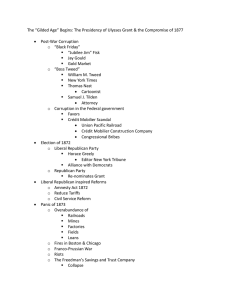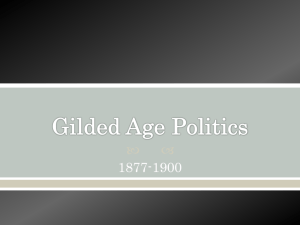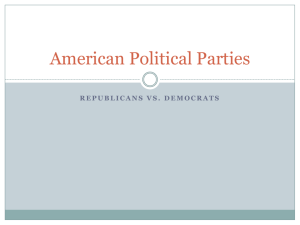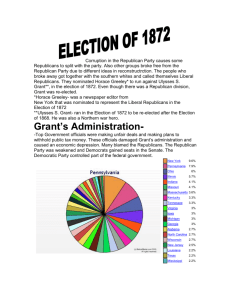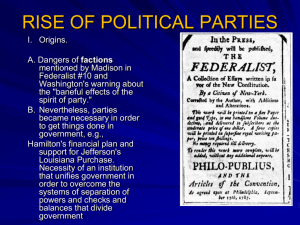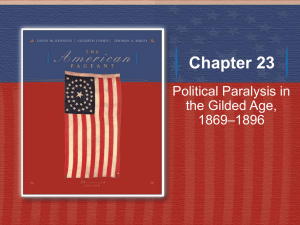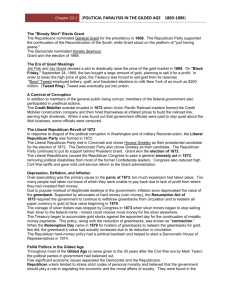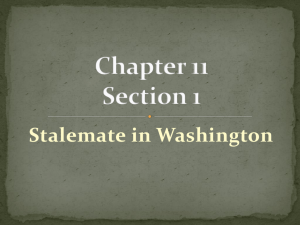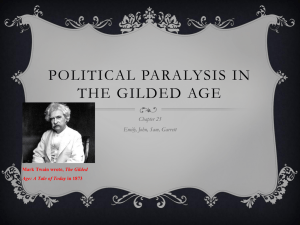Rachel Rippey Ms. Scott AP US History 25 September 2012 Gilded
advertisement
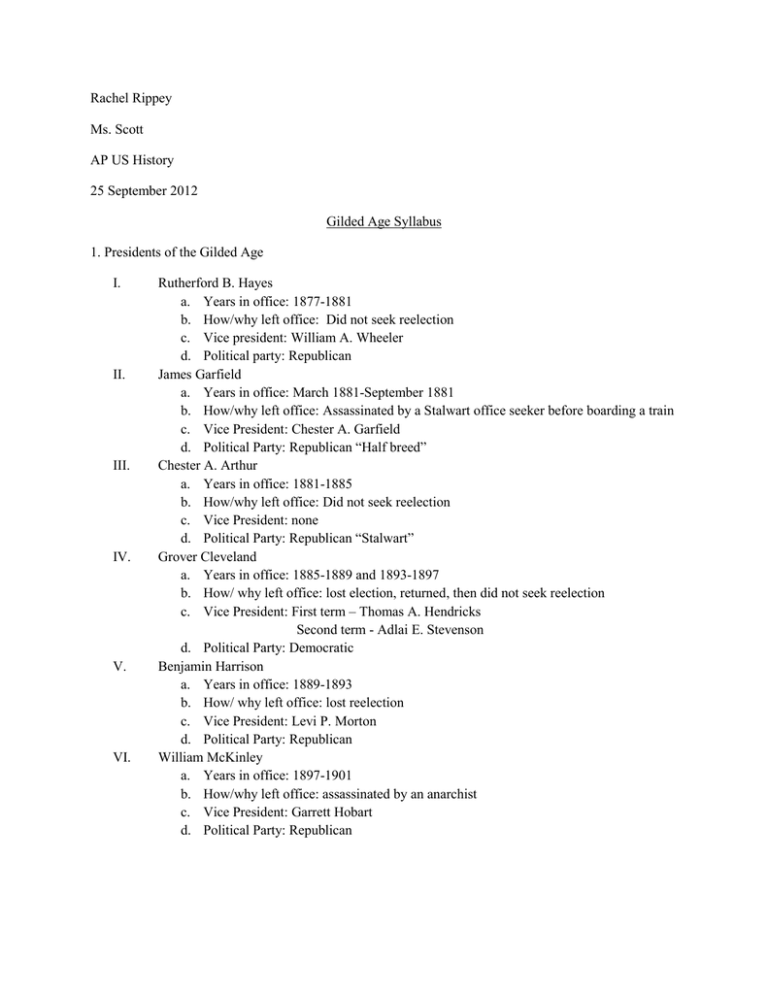
Rachel Rippey Ms. Scott AP US History 25 September 2012 Gilded Age Syllabus 1. Presidents of the Gilded Age I. II. III. IV. V. VI. Rutherford B. Hayes a. Years in office: 1877-1881 b. How/why left office: Did not seek reelection c. Vice president: William A. Wheeler d. Political party: Republican James Garfield a. Years in office: March 1881-September 1881 b. How/why left office: Assassinated by a Stalwart office seeker before boarding a train c. Vice President: Chester A. Garfield d. Political Party: Republican “Half breed” Chester A. Arthur a. Years in office: 1881-1885 b. How/why left office: Did not seek reelection c. Vice President: none d. Political Party: Republican “Stalwart” Grover Cleveland a. Years in office: 1885-1889 and 1893-1897 b. How/ why left office: lost election, returned, then did not seek reelection c. Vice President: First term – Thomas A. Hendricks Second term - Adlai E. Stevenson d. Political Party: Democratic Benjamin Harrison a. Years in office: 1889-1893 b. How/ why left office: lost reelection c. Vice President: Levi P. Morton d. Political Party: Republican William McKinley a. Years in office: 1897-1901 b. How/why left office: assassinated by an anarchist c. Vice President: Garrett Hobart d. Political Party: Republican 2. After the Civil War, the Grand Old Party of the Republican Party dominated American politics. Having originated from President Lincoln, the Republican Party received support from the minorities in America, along with white Protestant northerners. The Democrats resided in the South states of the former confederacy, which supported state’s rights and limited powers in the government. This was an outdated mindset during the Gilded Age. The Republicans introduced the “bloody shirt” tactic, this was to remind the citizens of the bloodshed of the Civil War and the so-called evil the confederacy presented and the problems that arose. However, the return of the democrats occurred in 1890, when Midwesterners and other voters who opposed the new reforms the republicans were making, came back to the Democratic Party. While the only Democratic president of the gilded age was Grover Cleveland, the rest of the presidents that served during this time were all from Republican roots. 3. While the economic aspect of this time period seemed to be booming, the politics were disregarded. The idea of new money and the industrialization of the factories, railroads and banks contributed to the fall of political government with little substance. The stalemate within in the politics of the Gilded Age was due to the prevailing ideology of a limited government, the campaign tactics of the two parties, and party patronage. The building of the modern political parties all began to take place during the Gilded Age and also the monetary policy goes through dramatic changes during this period. All of these factors weaken the political system and the factional parties within the government. 4. The Compromise of 1877 was indeed a wise adjustment to avoid the renewal of serious sectional conflict because of the continued military Reconstruction in the South. The Democrats were getting ded up with this Reconstruction idea, when the compromise was figured, both of the geographical locations won. The North got Hayes as the president and the South got their freedom back. Unfortunately, this ended all supports for the African-American man in the South, leading to the Jim Crow laws and many awful lynchings. Outline of Pageant Chap. 23 The “Bloody Shirt” Elects Grant o o o o o Americans are sore about politicians due to conflict between Johnson and Congress Democrats could not agree on anything except the end of military Reconstruction “the Ohio Idea” redemption in greenbacks Horatio Spencer Democratic nominee(NY governor) Grant won election, Mostly blacks voted for Grant The Era of Good Stealings o o o o Post war politics were a mess (man on the mood would hold his nose) Jubilee Jim Fisk (bass) and Jay Gould(brains) 1869; cornered the gold market Burly ‘Boss’ Tweed used intimidation and graft to steal 200 million NY times found evidence against Tweed and exposed his doings, NY attorney Samuel J Tilden prosecuted A Carnival of Corruption o o o o o o Grant’s cabinet full of grafters and family attached themselves to the public payroll. Credit Mobilier scandal of 1872: Union Pacific Railroad insiders hired themselves at inflated prices. Distributed stock to congressmen (including the vice president) The breath scandal in DC: 1874-1875 Whiskey Ring robbed the reassure of millions in excise tax revenue. Own secretary came up the culprit Secretary of War William Belknap resigned after pocketing bribes from the suppliers to Indian Reservation. The Liberal Republicican Revolt of 1872 o o o o Liberal Republicans banded together in 1982 to purge DC and end military Reconstruction Nominated Horace Greenley for presidency editor of the New York Tribune. Democrats sided with Greenley and Republicans sided with Grant. Republican Congress in 1872 general amnesty act. Depression Delation and Inflation o o o o o Economic Panic of 1873, 13,000 businesses went bankrupt. Debtors – Inflation “more money cheaper money” creditors wanted deflation. “Hard Money” advocates in 1874 persuaded Grant to print more money. Resumption Act of 1875, withdrawal of greenbacks from circulation and redemption of all paper currency in gold at face value beginning in 1879. Helped elect Democratic House of Representatives in 1874, 1878 spawned greenback labor party. Pallid Politics in the Gilded Age o o o Democrats and Republicans agreed on national issues Formations of modern parties Liberal and conservative Democrats – south and industrial cities/Republicans – Midwest and rural Northeast. The Hayes-Tilden Standoff o o Rutherford B. Hayes Republican Ohio native, “The Great Unknown”, Samuel J Tilden Democrat Nominee Who would count electoral votes if House is Republican and Senate is Democrat The Compromise of 1877 and the End of Reconstruction o o o o Election Count Act – 15 men from Senate, HoR and Supreme Court Compromised that Hayes would end Reconstruction in South and Subsidizing the Texas and Pacific transcontinental line. Abandoned its commitment to the racial equality Civil Rights Act of 1875: equal accommodations The supreme court pronounced act unconstitutional in Civil Rights Cases (1883) and declared 14th amendment prohibited government violation of civil rights not the denial by individuals The Birth of Jim Crow in the Post-Reconstruction South o o Blacks were friendless, forced into sharecropping and tenant farming, crop lien system Jim Crow Laws – Plessy vs. Ferguson “separate but equal” Class Conflicts and Ethnic Clashes o o o o 1877 railroad strike after employers cut wages by 10%, failed strike Immigration of Chinese into California (9% of population) all males searching for gold/ working on railroads Denis Kearney enticed followers to violently abuse Chinese for competition of cheap labor Chinese Exclusion Act of 1882 (remained closed until 1943) U.S. vs. Wong Kim in 1898 14 th amendment guaranteed birthright citizenship Garfield and Arthur o o o o o Garfield ‘waved the bloody shirt’ victory over Winfield Scott Hancock with vice president stalwart Arthur Ensnared in political dispute between sec of state James Blaine and Roscoe Conkling Shot by Charles J Guiteau deranged office seeker (stalwart) Death positive outcome of reforming spoils system Pendleton Act of 1883: civil service reform 10% of jobs must be trained for the job The Blaine-Cleveland Mudslingers of 1884 o o o Republicans “Ma Ma where’s my Pa” Democrats “Burn this letter’ Both regarding personal issues with the candidates NY clergyman condemned democrats ‘Rum, Romanism, and Rebellion” insulting Irish Old Grover Takes Over o o o Approved of laissez-faire, bankers and business people liked him after he vetoed a bill to provide seeds for Texas farmers. Elected ex-confederates for his cabinet, stay loyal to Democrats or Mugwumps who supported his campaign Military Pensions, GAR lobbied private pension bills people who didn’t actually deserve them Cleveland Battles for a lower Tariff o o Voted for lower tariffs(lower prices for consumer, less protection for monopolies, and end in the treasury surplus Democrats disappointed, Republicans happy. Lost election to Ben Harrison Billion Dollar Congress o o o Thomas B. Reed of Maine became speaker of the house(HoR) McKinley Tariff act of 1890 The number of Republicans in the House decreased after the election of 1890 The Drumbeat of Discontent o o o o o 1892 Populist party rooted in the farmers alliance of west and south and gathered in Omaha to produce a platform of free and unlimited coinage of silver Nominated Greenbacker General James B Weaver for presidency Presidential election; broke into electoral column just nit electoral majority Tom Watson reached out to the black community After 1896, populist party lapsed into vile racism and disfranchisement Cleveland and Depression o o o o Depression of 1893: 4 years, splurge of overbuilding and speculation, labor disorders, and agricultural depression Needed repeal of Sherman silver purchase of 1890 stopped the bleeding of gold form the treasury In danger of going off the gold standard Turned to JP Morgan took out a loan from wall street. Cleveland Breeds a Backlash o o “sellout” of national government with taking out loans from JP Morgan Wilson Gorman Tariff of 1894 : pledged to lower tariffs Amsco PEDLIGS PEOPLE: Roscoe Conkling: leader of the stalwarts Rutherford B. Hayes: Republican President from Ohio elected in 1877. Ended Reconstruction James Garfield: Half Breed Republican elected in 1880, ran against Winfield Hancock, assassinated by Charles Guiteau – a political anarchist Chester A. Arthur: Was VP under Garfield, assumed office after his death. He was a Stalwart Republican. Chinese Exclusion Act, Pendleton Act Thomas Reid: Speaker of the House from Maine in 1890 who instituted an autocratic rule over the House. “Czar” James G. Blaine: Also from Maine, great political leader and succeeded in reshaping the Republicans from an antislavery party into an organized business-oriented party. Evidence supports his dealings with railroad scandals and other corruption. Grover Cleveland: In the election of 1884 against James G. Blaine lots of mudslinging. He was Democratic. Only president ever to serve two nonconsecutive terms refused to annex territories outside of the US. Ran for election again in 1892 and won. James B. Weaver: The Populist candidate from Iowa for presidency in the election of 1892 Benjamin Harrison: Republican candidate who ran against Grover Cleveland in 1888, lost popular vote but won electoral vote – therefore he won the election. EVENTS: Crime of 1873: The government took America off the bimetallic standard DOCUMENTS: McKinley Tariff of 1890: Raised imports to 48.4% The tariff was detrimental to the American farmers who were already greatly in debt. This is because if America raises the tariff on foreign imports, so will foreign countries raise their tariffs on American goods. Due to the fact that most American Agricultural products are for exports, by increasing the tariff, the farmers market for their goods become smaller, forcing them to sell their products at bankruptcy prices at home. This Act was passed by the Billion Dollar Congress LAWS: Sherman Silver Purchase Act: Was enacted in 1890 as a United States federal law. While not authorizing the free and unlimited coinage of silver that the Free Silver supporters wanted, it increased the amount of silver the government was required to purchase every month It backfired because people exchanged their silver notes for gold dollars, depleting the governments gold reserves. Led to the panic of 1893 Pendleton Act: An 1883 United States federal law that established the United States Civil Service Commission, which placed most federal employees on the merit system and marked the end of the socalled spoils system. Drafted during the Chester A. Arthur administration, the Pendleton Act served as a response to President James Garfield’s assassination by Charles J. Guiteau Bland Alison Act (1878): A United States federal law enacted in response to the Fourth Coinage Act that demonetizing silver. It was an attempt to bring back silver because gold was the only metallic standard before this act IDEAS: Gilded Age: The title of Mark Twain’s book written in 1873 describing the time period, it referred to the superficial glitter of the new wealth so prominently displayed in the last years of the 19th century. The politics during this age were corrupt and shown with little substance complete with forgettable presidents and the parties refusing to take a stand on controversial issues. “Rum, Romanism, and Rebellion”: During the election of 1884 between Blaine and Cleveland, major mudslinging was going on. A Republican clergyman condemned the Democratic Party as the party of Rum, Romanism, and Rebellion. This quickly insulted the Catholic and Irish Americans who then voted for Cleveland, ultimately, contributing to his victory. solid South: Democrats after 1877 could count upon winning every election in the former states of the Confederacy. The solid South was indeed solidly Democratic until the mid 20th century. veterans pension: The veterans who fought in the Civil War were promised pensions but did not get them until the 1890s. 400,000 joined the Republican Party and got $157 million in pensions. This is still one of the largest welfare programs to date. GOVERNMENT STUFF: Billion Dollar Congress: The 51st Congress which had access to a billion dollar surplus in the Treasury. This passed the Pension Act of 1890, which provided pensions for all Union Civil War veterans who had served for 90 days and were no longer capable of manual labor. This policy solved the dilemma of the existing surplus. Stalwarts: A faction of the Republican Party in the ends of the 1800s supported the political machine and patronage. Conservatives, who hated civil service reform, were seen as inflexible. Led by Roscoe Conkling of the Senate and they believed in purpose and goals. They were resistant to change. Half Breeds: term of disparagement ginned-up by the Stalwarts, was applied to the moderate faction of the Republican Party They backed Hayes; lenient treatment of the South and supported moderate civil service reform but not the way you think. James G. Blaine of Maine was the leader of this group, but failed to win the party nomination in 1876 and 1880. James A. Garfield was also affiliated with the HalfBreeds. They did not want to do away with nepotism completely, they wanted to change who got to hand out the federal jobs. Mug Wumps: Members of the Republican Party in conflict with “Stalwarts” and “Half breeds”. Tended to vote with Democratic party because of conflicts over reform. Was from Indian word meaning – Big Chief, and they opposed the spoils system. The Mug Wumps were led by Carl Shurtz Greenback party: a former political party in the United States; organized in 1874; opposed any reduction in the amount of paper money in circulation. Supported paper money, in congressional election of 1878, the Greenback candidates received 1 million votes and 14 members were elected to congress. This included James B. Weaver who would later become the Populist Party leader. The party died after the hard times of the 1870s but the goal of increasing the amount of money in circulation did not Populist Party: The "People's Party," it flourished particularly among western farmers, based largely on its opposition to the gold standard. A Third party that had not existed for decades. This political party was formed to fight the abuses from big businesses and government apathy. Their platform was anti elite and it’s formed in 1892 and it’s called the Omaha Platform. William Jennings Bryan will be their national candidate. The Populists wanted the end of the national bank, the free and unlimited coinage of siler, reduction of tariffs, and graduated federal income tax.
